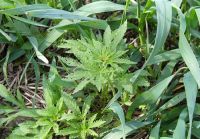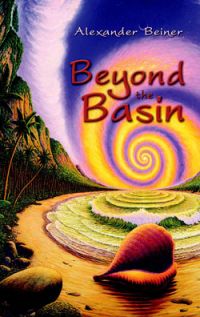 |
Originally published in 2009 ‘Beyond the Basin’ is a novel by Alexander Beiner. It tells the story of a journalist called Alex, asked to cover a story in South America shortly after being hired for a new job, and Anjuiga, a young girl living with an indigenous tribe that subtly titters on the edge of catastrophe. Set against an increasingly wild and natural setting, their stories entwine through a strange ethereal presence created through dreams and plant hallucinogens, leading finally to a savage and experimental end.
Having interspersed passages between Alex and Anjuiga’s stories has the effect of disorientating the reader and creating an intrigue. Not simply because one wonders what, if any, the connection is between them, but in that it allows the creation of a closed operable space within the text, one which Beiner expertly manipulates. The rate of narrative revelation steadily intensifies, by first layering in other character threads, like the shaman Kuuhra, then simultaneously meshing Alex’s dreamscape with Anjuiga’s setting and collapsing the geographical space between the two stories; the culmination of which is a wonderfully inventive magic mushroom trip.
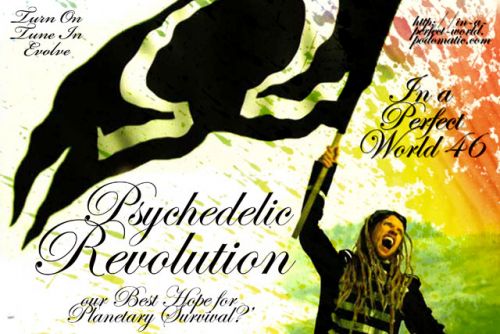
TURN ON, TUNE IN, EVOLVE... In the 1950s corporations used psychedelics as creativity tools... can modern companies -- and strategic individuals -- use psychedelics to help solve some of the most pressing problems of our time? Can a global psychedelic village think its way out of planetary crisis, or get back into Gaian union? Can we all have the shared vision of a psychedelic utopia if we all have different psychedelic experiences? Is psychedelic elitism a danger and is our grasping at utopias falling prey to it? Should we be dosing Steven Hawking, and the world intelligentsia or should they be volunteering for the front lines of consciousness expansion? With a sense of urgency building on planet earth, is a NEW type of psychedelic revolution our best hope for planetary survival? Experiential journalist Rak Razam asks this provocative question to a panel of experts at the Entheogenesis Australis 2010 conference including: Rick Doblin (President of MAPS, the Multi-discipline Association of Psychedelic Studies), Henry Cox (senior anthropologist at the Kimberley Land Council), Joseph Gelfer (author and researcher in the School of Political and Social Inquiry at Monash University), Torsten Wiedermann (Shaman Australis)and Carl Turney (EGA).
While most of this slideshow reads like America's Funniest Home Videos, I did learn about father of the year, Donald Curtis Denney, who tried to pass a golf ball sized parcel of heroin to his son in prison, via mouth kiss, after getting it in to the jail in his rectum.
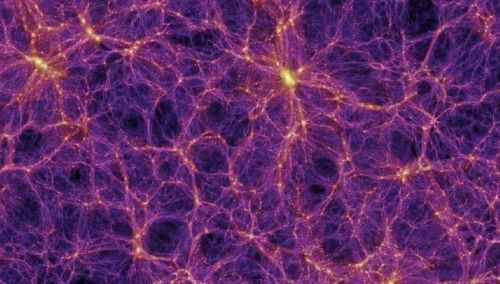
This research paves the way for an entirely new class of drugs: Neural steroids.
The first clear evidence of how antidepressant drugs help to boost brain cell formation could lead to better treatments for depression.
The hippocampus is one of just two brain regions known to grow new neurons throughout life - a process called neurogenesis. This process is disrupted in people with depression, although it is not known whether this is a cause or symptom of the condition. It is clear, however, that one of the ways that antidepressants work is by boosting neurogenesis in the hippocampus. Christoph Anacker and his colleagues at King's College London have now worked out how they do so.
Previous research has shown a link between some antidepressants and stress hormones called glucocorticoids. So Anacker's team decided to test whether the antidepressant sertraline acts on the glucocorticoid receptors of brain cells. They grew human hippocampal progenitor cells in a dish and added sertraline. Ten days later, the cultures showed a 25 per cent greater than expected increase in the number of new neurons.
[Thanks Ben!]
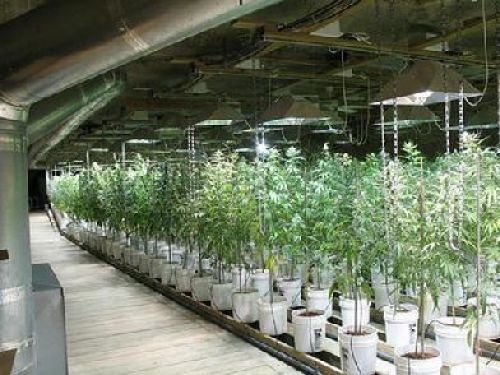
According to a study done by a staff scientist at the Lawrence Berkeley National Laboratory, the energy costs of indoor marijuana production accounts for approximately 1% of national energy consumption, roughly 5 billion dollars annually, or enough energy to power 2 million American homes.
The emergent industry of indoor Cannabis production results in prodigious energy use, costs, and greenhouse-gas pollution. Large-scale industrialized and highly energy-intensive indoor cultivation of Cannabis is driven by criminalization, pursuit of security, and the desire for greater process control and yields. The practice occurs across the United States and in many other countries.
The analysis performed in this study finds that indoor Cannabis production results in energy expenditures of $5 billion each year, with electricity use equivalent to that of 2 million average U.S. homes. This corresponds to 1% of national electricity consumption or 2% of that in households. The yearly greenhouse-gas pollution (carbon dioxide, CO2 ) from the electricity plus associated transportation fuels equals that of 3 million cars. Energy costs constitute a quarter of wholesale value.
In California, the top-producing state--and one of 17 states to allow cultivation for medical purposes--the practice is responsible for about 3% of all electricity use or 8% of household use. Due to higher electricity prices and cleaner fuels used to make electricity, California incurs 70% of national energy costs but only 20% of national CO2 emissions.
[Thanks Luke!]
 | | Four Loko banned for being too intoxicating |
File under: Studies that tell us what we already know.
The vodka Red Bull, or VRB, has become a favorite cocktail among some young revelers. (One fan even made a video homage, to the tune of Rupert Holmes' 1979 hit "Escape:The Pina Colada Song.") But scientists say that tipplers of caffeine-laden energy drinks mixed with alcohol may have a tougher time knowing when to stop than those who imbibe booze alone.
Researchers at Northern Kentucky University tested students' reaction times while drinking Red Bull with vodka. The students who drank the buzzy cocktail felt more alert and peppy than students who were just quaffing vodka, but were just as bad at controlling their actions as an old-fashioned drunk.
"When you consume alcohol plus an energy drink, you're still as impaired" as someone drinking just alcohol, says Cecile Marczinski, an assistant professor of psychology at Northern Kentucky University. She is lead author of the study, published online in Alcoholism: Clinical and Experimental Research.
[Thank Luke!]
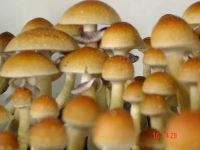 |
Psychedelic drug users throughout the ages have described their experiences as mind-expanding. They might be surprised, therefore, to hear that psilocybin -- the active ingredient in magic mushrooms -- actually decreases blood flow as well as connectivity between important areas of the brain that control perception and cognition.
The same areas can be overactive in people who suffer from depression, making the drug a potential treatment option for the condition.
The study is the first time that psilocybin's effects have been measured with fMRI, and the first experiment involving a hallucinogenic drug and human participants in the UK for decades.
Robin Carhart-Harris at Imperial College London and colleagues recruited 30 volunteers who agreed to be injected with psilocybin and have their brain scanned using two types of fMRI.
Half of the volunteers had their blood flow measured during the resulting trip; the rest underwent a scan that measured connectivity between different regions of the brain.
Less blood flow was seen in the brain regions known as the thalamus, the posterior cingulate and the medial prefrontal cortex. "Seeing a decrease was surprising. We thought profound experience equalled more activity, but this formula is clearly too simplistic," says Carhart-Harris. "We didn't see an increase in any regions," he says.
Decreases in connectivity were also observed, such as between the hippocampus and the posterior cingulate and medial prefrontal cortex.
"Under psilocybin you see a relative decrease in 'talk' between the hippocampus and these cortical hub regions," says Carhart-Harris. "Changes in function in the posterior cingulate in particular are associated with changes in consciousness."
[Thanks layne_says!]
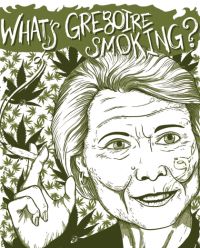 | | Christine Gregoire, from Cannabis Defense Coalition |
Toke of the Town calls Governor Gregoire "Chicken" for asking for federal permission before fully backing the new legislation.
The feds are throwing their weight around again when it comes to Washington state's medical marijuana law. A proposal to rewrite the state's medicinal cannabis rules attracted federal attention after Governor Christine Gregoire asked for "clear guidance" about the U.S. Department of Justice's position on state-licensed medical marijuana dispensaries, which would be legalized under the new rules.
Gov. Gregoire, who sent the letter to U.S. Attorney General Eric Holder on Wednesday, claims she "became concerned" about a "potential federal crackdown" after speaking with the U.S. attorneys for Eastern and Western Washington, Michael Ormsby and Jenny Durkan, reports Jonathan Martin at the Seattle Times.
The prosecutors claim they are concerned that the proposed legislation "would legalize commercial sales of marijuana," according to state Sen. Jeanne Kohl-Welles, the bill's prime sponsor.
U.S. attorneys Ormsby, who already started threatening Spokane dispensaries last week, and Durkan noted that the U.S. attorney for Northern California was threatening to prosecute operators of a proposed commercial grow farm in Oakland, even though the farm was licensed by that city and legal under state law, Gov. Gregoire said in her letter to the Attorney General.
The bill in question, SB 5073, would create new state licenses for dispensaries, grow farms and cannabis food processors. State licensing of dispensaries is already in place or is currently being implemented in states like Colorado, Maine, New Jersey and New Mexico, as well as in the District of Columbia.
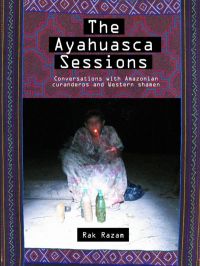 |
Originally published in 2010 'The Ayahuasca Sessions – Conversations with Amazonian curanderos and Western shamans' is by Rak Razam. Razam is a journalist, author of 'Aya: A shamanic odyssey' and editor of 'The Journeybook: Travels on the Frontiers of Consciousness'. This book is a transcription of interviews he conducted with shamans, many of whom he talks about in his book Aya.
Rak Razam describes the rise of the hallucinogenic brew ayahuasca as one of a series of booms that have occurred in South America. Firstly rubber in the nineteenth century, then oil in the twentieth, and now ayahuasca. With ayahuasca tourism on the rise, the curanderos and curanderas, or to the Western mind 'shamans', are in high demand. In the past, South America was exploited for raw materials, its people treated as tools for this endeavour. Ayahuasca, however, is no simple raw material exported to fuel the West, and the shamans who wield the plants are not simply the West's tools. Rather, the shaman, the plants and the land are a potent trio, purporting to have the power to transform the West just as much as the dollar transforms their indigenous culture. Razam interviews a fascinating collection of individuals from this world, creating a window into this ever changing frontier...
Ontario is one step closer to the legalization of marijuana after the Ontario Superior Court struck down two key parts of the Controlled Drugs and Substances Act that prohibit the possession and production of pot.
The court declared the rules that govern medical marijuana access and the prohibitions laid out in Sections 4 and 7 of the act "constitutionally invalid and of no force and effect" on Monday, effectively paving the way for legalization.
If the government does not respond within 90 days with a successful delay or re-regulation of marijuana, the drug will be legal to possess and produce in Ontario, where the decision is binding.
[Thanks Jonathan and Josh!]
|

Recently @ DoseNation
|
|












